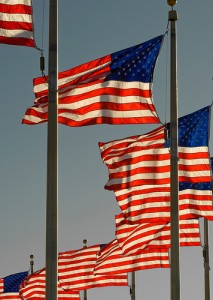
The State of the Beacon
While much of President Obama’s State of the Union Address focused on issues at home, he did take a moment to explore the importance of the American message.
First, he emphasized the importance of the idea that America represents to much of the world:
Above all, America must remain a beacon to all who seek freedom during this period of historic change. I saw the power of hope last year in Rangoon – when Aung San Suu Kyi welcomed an American president into the home where she had been imprisoned for years; when thousands of Burmese lined the streets, waving American flags, including a man who said, “There is justice and law in the United States. I want our country to be like that.”
This example rang out as particularly powerful. While we cannot and should not expect all nations around the world to become perfect copies of the American system, it is crucial that we uphold the founding principles of this nation that prove to be powerful examples for others to follow.
And though our example is powerful, it is also important to understand that neither our principles nor public diplomacy were necessarily the driving factors for catalyzing change in Burma. If positive trends continue in Burma, it may prove to be a case study for the application of so called “smart power.” Hard power tools like sanctions and diplomatic isolation may have proved vital in causing the military-ruled government to begin the process of reform—but soft power, public diplomacy, and people-to-people engagement will ultimately help to drive those reforms to be more meaningful and long-lasting.
The President also touched on an issue that may prove to be more sensitive. Highlighting the wave of change that has been occurring in the Maghreb and the Middle East, he said:
In defense of freedom, we will remain the anchor of strong alliances from the Americas to Africa; from Europe to Asia. In the Middle East, we will stand with citizens as they demand their universal rights, and support stable transitions to democracy. The process will be messy, and we cannot presume to dictate the course of change in countries like Egypt; but we can – and will – insist on respect for the fundamental rights of all people. We will keep the pressure on a Syrian regime that has murdered its own people, and support opposition leaders that respect the rights of every Syrian.
It is incredibly difficult to ascertain just what all of this means. Does “standing” with citizens mean providing moral support? Does it mean material support? Does it mean training? In the post-WWII era, it is correct that the United States cannot dictate democracy. Instead, it is critical that the will for democratic transition develops from within. As such, it is in the American interest to provide the human contact that can help nurture these desires. Governance training, cultural engagement, and staying true to commitments to our partners overseas as part of building trust relationships will help to strengthen such burgeoning democratic movements.
The U.S. must also better understand its audiences overseas in order for this to be successful. Are they fighting for democracy? Are they fighting for mere regime change? Are they fighting for the institution of a government that better reflects the desires of only a particular sect of people? We must understand what it is that foreign publics—in all their intricacies—are trying to accomplish and how their goals relate to our own strategic objectives. Knowing the answers to these questions can only be accomplished through continued person-to-person engagement.
Finally, though the use of force and violence is sometimes required for democracy to flourish, it is the power of ideas that will ultimately determine the long term success of such movements overseas. The American Revolution, a violent act powered by the idea of certain inalienable rights, used force as a means to establish a resilient democracy. Imperfect as that democracy has been over the years, it is the resilience and determination to meet those ideals that inspires so many around the world to seek their own route to self-determination.







[…] The State of the Beacon […]